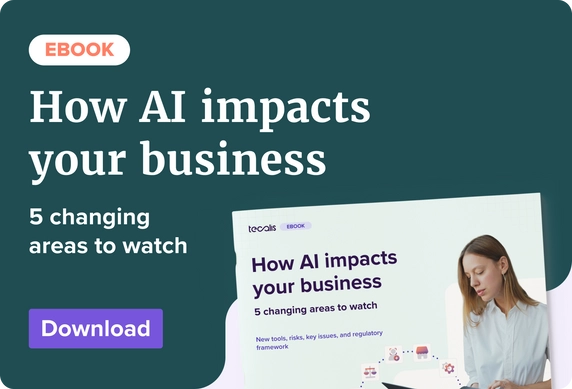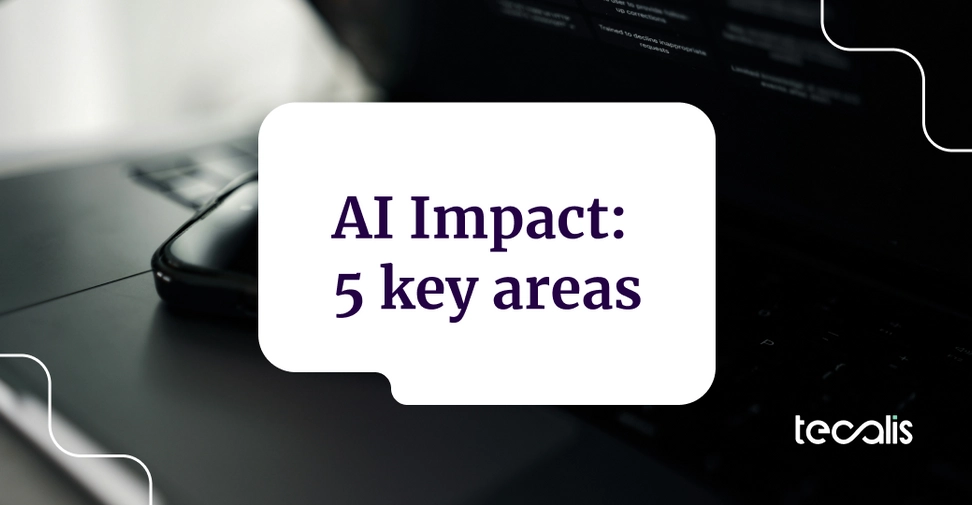Index
Get the latest news right in your inbox
Artificial intelligence (AI) is no longer a technological promise but a catalyst that has already profoundly transformed business operations across industries.
From fraud prevention to the automation of complex tasks, this technology offers not only opportunities, but also challenges that require immediate attention. In this article, we will explore the five key areas where AI is having a significant impact, as well as the strategies and solutions available to maximize its potential to help your business in enterprise, customer or sales across several key industries.


Fraud Prevention: New Threats and Tools
Fraud has evolved considerably in recent years, especially driven by digital technologies and the rise of e-commerce. Today, cybercriminals employ AI to develop more sophisticated attacks, such as deepfakes, advanced bots and automated phishing.
- AI-driven fraud: Methods such as "identity synthesis fraud," where fake identities are created by combining real and fictitious data, are complicating traditional detection. Another example is the use of bots that mimic human behavior patterns to access vulnerable systems.
- AI-proof solutions: To meet these challenges, tools such as biometric identity verification and machine learning algorithms are essential. These solutions make it possible to detect anomalous patterns in real time, anticipating threats before they materialize.
In addition, implementing AI-based RegTech solutions provides enterprises with a proactive and predictive approach to dynamic threats, minimizing false positives and optimizing accuracy in detecting suspicious activity without compromising the agile user experience in processes such as digital onboarding.
Regulatory Compliance: Adapting to an Evolving Framework
Regulation around artificial intelligence is a constantly evolving field, especially in highly regulated sectors such as finance, healthcare and technology. Legislation, such as the General Data Protection Regulation (GDPR) and the European Union's AI Act, underlines the need to ensure transparency, security and ethics in the use of AI.
- Compliance automation: AI-powered tools enable ongoing monitoring of transactions, ensuring compliance and significantly reducing associated operational costs.
- eIDAS 2 and PSD3: New regulations in Europe demand higher standards in authentication and data management. Solutions such as advanced electronic signatures and the use of interoperable digital wallets are enabling companies to comply with these requirements in an agile manner.
Integrating AI into compliance strategies not only ensures the avoidance of penalties, but also allows you to transform compliance into a competitive advantage.

Customer Experience and Digital Contracting: The New Standard
Customer experience is at the core of any business strategy, and AI is revolutionizing the way companies interact with their users. The digitization of onboarding and recruitment processes has reduced time, improved security and increased conversion rates.
- Streamlined processes: AI facilitates identity verification through biometrics and bank scraping, eliminating common frictions in manual processes and speeding up the onboarding flow.
- B2B and B2C with shared AI: Although processes differ between enterprise and consumer environments, AI enables modular solutions that adapt to both cases, maximizing operational efficiency in processes such as Know Your Business (Business Verification).
Companies that adopt integrated platforms for onboarding report a 47% increase in conversions and a drastic reduction in costs associated with the process.
Commercial Strategies: Adaptation in a Hypersegmented Market
In an increasingly complex market, hyper-segmentation and personalization are key to staying competitive. AI offers tools to better understand consumers and optimize each point of sale, branch or sales office.
- Omni-channel management: Platforms such as Tecalis Customer Hub centralize data from multiple channels, from physical stores to marketplaces, enabling consistent and personalized experiences. In addition, this platform provides sales tools for sales reps such as pricing or customer and promotions managers.
- Predictive analytics: Advanced algorithms identify patterns in real time, helping commercial networks to adjust their strategies and maximize ROI.
The future of retail depends on the ability to integrate physical and digital experiences. Technologies such as AI-enabled interactive kiosks are leading this transformation, offering autonomous and personalized services. Another point of innovation is in physical digital experiences with AI such as self-service interactive kiosks.

Data Analytics and Automation: Driving Efficiency
Data management and automation are essential for modern operations. Tools such as Computer Vision (OCR 2nd Gen) and Robotic Process Automation (RPA) are making a difference.
- Document processing: AI-based solutions scan, interpret and validate legal and financial documents with greater accuracy and speed than traditional methods.
- Combined RPA and AI: The union of these technologies enables the management of repetitive and unstructured tasks, from data entry to the generation of complex reports.
Companies that integrate these systems experience seamless connectivity between platforms, optimizing resources and aligning operational processes in real time.
AI as a Strategic Pillar for the Future
Artificial intelligence is not only transforming industries, it is also redefining what it means to be competitive in the 21st century. Companies that take a strategic approach to AI, implementing advanced solutions and complying with demanding regulations in an automated way in any market, will not only survive, but lead in their industries.
Investing in technologies that combine fraud prevention, compliance, customer optimization and automation will ensure not only relevance, but also success in an increasingly digitized global marketplace.
























